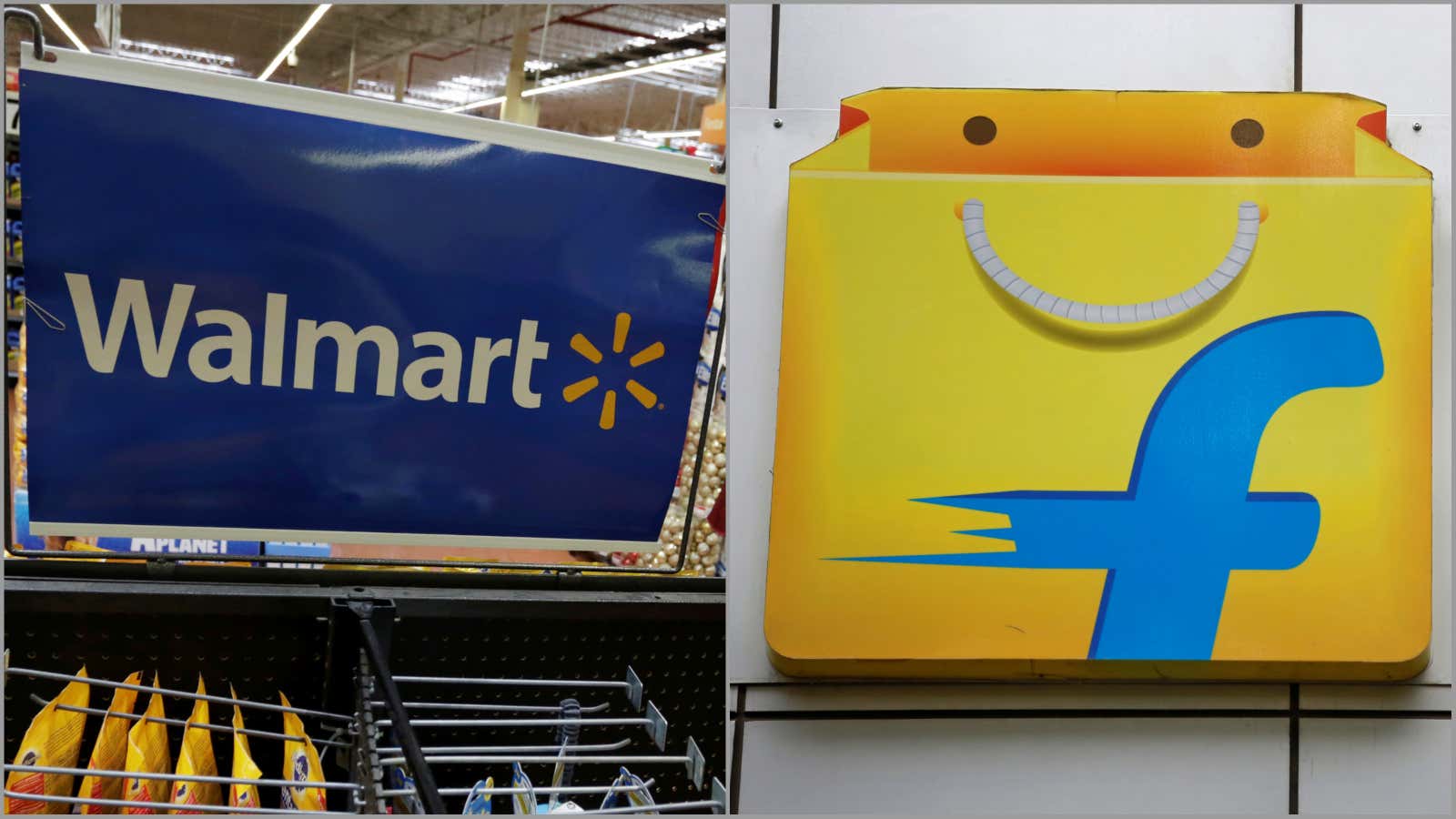As if India’s e-commerce space had not seen enough drama already, a new entrant has arrived with the promise to take it to the next level.
In a $16 billion (over Rs1 lakh crore) deal, US retail giant Walmart is buying a majority stake in the largest domestic player in the space, Flipkart.
This move gives Walmart a foot in the door in India’s $670 billion retail market, which it has struggled to play in for over a decade now. Despite having entered India back in 2007, Walmart operates just 21 wholesale stores in the country and has not been able to expand into direct retail due to restrictive government policies.
But Flipkart might be its big break, and there’s no way the company is going to miss this opportunity.
“I think Walmart is preparing to build a truly omni-channel business in India,” Kartik Hosanagar, a professor of technology and digital business at the University of Pennsylvania’s Wharton School, told Quartz. “The Flipkart deal will give it access to consumers, a massive logistics network, and the platform on which to launch the omni-channel business.”
The impact of the Flipkart-Walmart deal will be far-reaching and is likely to provoke a response from rival Amazon. Experts believe that the Jeff Bezos-led company will rework its strategy for India, including increasing investments and looking at acquisitions.
The story so far
After a short-lived phase of several me-too players flooding the market, India’s e-commerce sector has come to be dominated mainly by two firms: homegrown Flipkart and Seattle-headquartered Amazon.
The two leaders have been battling since the latter entered India in 2013. Among other things, the two are often locked in price wars, offering steeper discounts to attract more shoppers. Executives at the two companies have publicly taken digs at each other, and Flipkart has even tried lobbying the Indian government to introduce protectionist policies that could curb Amazon’s business in the country.
But a clear winner has not yet emerged as both the companies hold around 30% of the market each. While Indian consumers trust Flipkart more, they search for Amazon more often and think it offers a better shopping experience.
What next?
Walmart’s entry is sure to heat up this rivalry further.
“Though Walmart isn’t a big online player in India, it is a force to be reckoned with for sure. They have strong logistics, supply chains, deep pockets, and are deeply committed to winning the Indian market,” said Pankaj Jain, an advisor to startups and funds, and a former member of startup accelerator 500 Startups. “Combined with Flipkart, this makes a very strong competitor to Amazon.”
Even as Flipkart had several moneyed foreign investors, such as Japan’s Softbank and China’s Tencent, backing it already, the deal with Walmart goes way beyond just money. It has a lot to do with learning from Walmart’s experience to run retail at a huge scale and implement similar strategies in India.
“The Walmart experience will be golden for Flipkart,” said Yugal Joshi, vice-president of Texas-based consulting and research firm Everest Group “Unlike most of their earlier financial investments, here we have someone who understands the retail business and how to run at scale.”
Recognising what’s at stake, Amazon was reportedly looking to make its own bid for Flipkart. However, possible anti-competition issues may have shelved those plans.
“Amazon will surely find competing with Flipkart to be a lot more difficult than earlier, but that is a challenge they will enjoy,” said Joshi. India is the biggest untapped opportunity for the firm, especially after competitors eclipsed it in neighboring China. It has already funneled in billions of dollars into its Indian business and may not hesitate to pour in more.
Beyond the big two
While Flipkart and Amazon have led the way, several vertical-focused companies have established a strong foothold in the Indian e-commerce space. For instance, there’s BigBasket in online grocery retail, Pepperfry and Urban Ladder in the furniture segment, and BlueStone and CaratLane in the jewellery space.
By concentrating on one type of product, these sites enjoy “better product pricing, greater control on quality of products, and, above all, high percentage of repeat customers,” Ameen Khwaja, the founder of LatestOne.com, an e-commerce site selling gadgets and mobile and tech accessories, wrote in Entrepreneur magazine. This makes them a threat to Flipkart and Amazon.
“The smaller players in many cases are more agile and open to new business models,” Adrian Lee, research director at Gartner, said. “They should concentrate on specialisation within their domains to build up a valuable cache of users seeking differentiated retail experiences.”
Flush with funds, Flipkart may now look to acquire some of these vertical-focused companies to grow its business. Already, the company has left rival Amazon far behind in the lifestyle and fashion segment with its acquisitions of Myntra and Jabong.
But not all such vertical-focused players may be easy targets. Even as Amazon and Flipkart have expressed interest in strengthening their business in the fast-moving groceries space, neither of them have succeeded in striking a deal with sector leader BigBasket, despite attempts. And now, BigBasket is reportedly looking to raise up to $500 million to battle the big two.
If past is precedent, one thing is for sure—there is no permanent winner in the retail business. “As of today, it looks like these two players will be completely dominant but you never know what will come up,” said Harish HV, an independent consultant and former partner at Grant Thornton. “Years ago, we thought Walmart is the king of retail and nothing can disturb it. Then, Amazon came along.”
